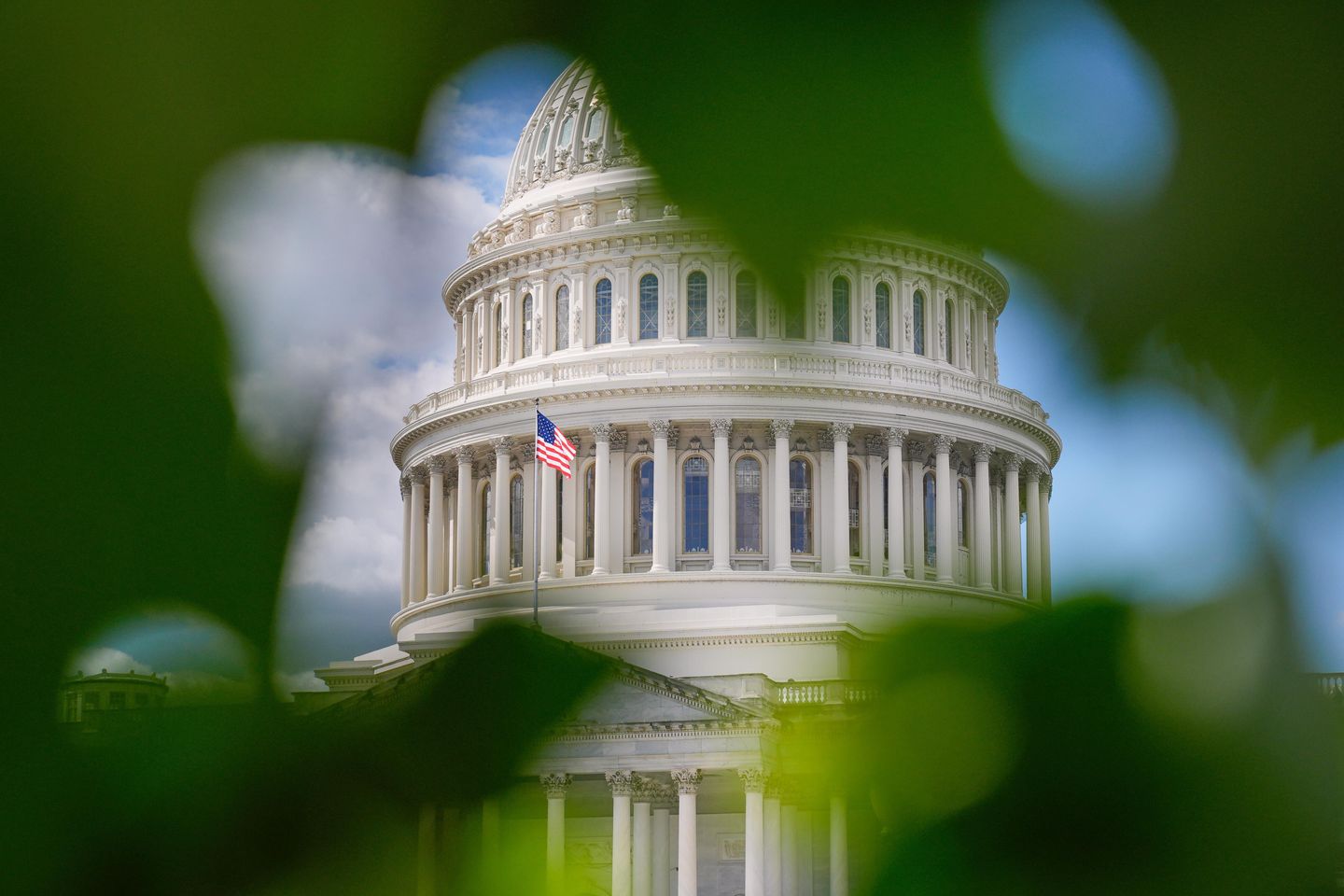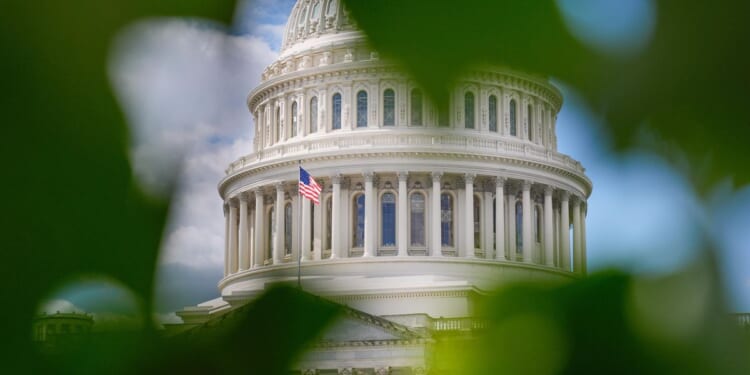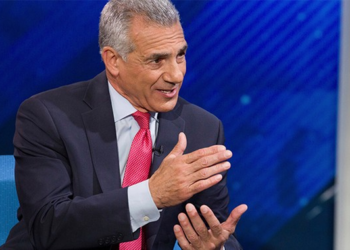
A newly released House bill to protect children online omits a key provision from the Senate version that sponsors and advocates argue is what gives the measure teeth against social media companies.
The Kids Online Safety Act, or KOSA, passed the Senate last Congress in an overwhelming 91-3 vote but stalled in the House.
Parent advocates are worried that the House will again be an obstacle after Republicans on the Energy and Commerce Committee released their version of the bill this week, which adds new language blocking states from enacting or enforcing any related laws.
The House measure, labeled as a “discussion draft,” also excludes a “duty of care” standard that is in the Senate version. The duty of care allows enforcement action to be brought against social media companies that fail to implement design standards to protect minors from specific harms, such as violence and harassment.
“I just don’t think that this draft, the way it’s written currently, will force the platforms to make any meaningful changes, and it will preempt good laws that parents have fought for in their states,” Maurine Molak, a parent advocate from San Antonio, told The Washington Times.
The House Energy and Commerce version of KOSA is one of 19 bills related to protecting kids in the digital age that will be discussed at a Commerce subcommittee hearing on Tuesday.
The Republican chairs of the full committee and subcommittee, Reps. Brett Guthrie of Kentucky and Gus Bilirakis of Florida, called the hearing an important first step to “enacting meaningful protections that can stand the test of time.”
Last year, when the House marked up a different version of the bill and watered down the duty of care language, Mr. Bilirakis said it was to ensure the law would survive court challenges. His office did not return a request for comment on the latest version.
Ms. Molak, whose son David died by suicide at age 16 after he developed a social media and online gaming addiction that led to relentless cyberbullying, plans to attend the hearing, along with other advocates from the Parents for Safe Online Spaces.
The coalition of parents has used their personal stories of losing their children to online harms and lobbied for state and federal laws to protect other children.
Ms. Molak, co-founder of the group, has been to Capitol Hill more than a dozen times to urge lawmakers to support KOSA and advocate for the duty of care provision as central to the legislation.
“Most, if not all, industries have some sort of a duty, a responsibility to protect users or to protect people who are using their products,” she said. “And this is the only industry that I know of that does not have any duty of care.”
Ms. Molak said the House draft is “a step backwards” and that she would like to see the Senate version passed or at least serve as the starting point for further negotiations.
She pointed to recent court filings that unveiled communications from Meta employees acknowledging their platforms are addictive to children and teens as evidence of why the duty of care provision is needed. One Meta employee likened Instagram to a “drug,” and another responded, “We’re basically pushers.”
Both the Senate and House versions of KOSA require social media companies to design controls for minors’ accounts that limit algorithms and features that promote compulsive usage.
They also force social media companies to default minors’ accounts to the most stringent safety and privacy settings and give parents more tools to manage those settings and add time and purchase restrictions.
The main difference between the two versions is that the Senate bill includes the duty of care provision to require social media companies to implement design standards to protect minors from specific harms and authorize the Federal Trade Commission to bring enforcement actions against companies that fail to do so.
The specific harms named in the Senate duty of care provision include physical violence; sexual exploitation; suicidal behavior; depression and anxiety with clinically diagnosable symptoms “related to compulsive usage;” eating and substance abuse disorders; distribution of drugs and alochol; deceptive financial practices; and “online harassment activity that is so severe, pervasive, or objectively offensive that it impacts a major life activity of a minor.”
The House bill includes less strict language requiring platforms to maintain policies to address threats of physical violence, sexual exploitation and abuse, distribution of drugs and alcohol and deceptive financial practices.
Sens. Marsha Blackburn, Tennessee Republican, and Richard Blumenthal, Connecticut Democrat, the lead cosponsors of the Senate version, have emphasized the importance of maintaining the duty of care standard and are not satisfied with the House version.
Ms. Blackburn said it “would not ensure Big Tech companies like Meta prioritize the safety of children over profit.”
“I look forward to working with our colleagues in the House to pass a bill that requires Big Tech companies to take responsibility for protecting the next generation from groomers, pedophiles, drug dealers, and other criminals who view the virtual space as their playground,” she said.
Mr. Blumenthal called the House draft “an industry-authored betrayal of the parents and young people who have spent years demanding action from Congress.”
A spokesperson for the House Energy and Commerce Committee declined to comment on the criticisms, saying panel leaders will make their case during next week’s hearing.
Ms. Blackburn and Mr. Blumenthal had previously updated their version of the bill to try to address House GOP concerns that it could infringe on free speech.
Their changes included provisions clarifying that nothing in the bill could be used to censor, limit or remove content from the internet or penalize users for their viewpoints. The update also specified that the FTC and state attorneys general would not have any power to bring lawsuits over content or speech.
Those changes won support from X and Apple, but companies like Google and Meta, which owns Instagram and Facebook, remain opposed to the legislation.
The House draft not only removes the duty of care that those opponents have fought against, but it also adds language to prevent states from enacting or enforcing any related laws.
That means states that have enacted stricter standards would not be able to enforce them if the House version of KOSA becomes law.
“The way that they have the preemption clause written is very difficult to swallow, because we also have a really strong [attorney general] here in Texas who has filed many lawsuits against these platforms for non-compliance of Texas laws,” Ms. Molak said. “And he’s had two of the largest settlements, one with Google and one with Meta, in the entire nation.”
Those settlements were related to broader data privacy violations, not specific to just children. But Texas Attorney General Ken Paxton is also suing TikTok for failing to comply with a state law requiring social media companies to provide parents with tools to control their children’s privacy and account settings.
Another change the House draft makes from the Senate version is changing the definition of when a social media company is deemed to “know” a user is a minor.
In addition to “actual knowledge,” the Senate version says knowledge can be “fairly implied on the basis of objective circumstances.” The House version says social media companies must have actual knowledge or “acted in willful disregard.”
Ms. Molak said that change was another red flag as she expressed overall frustration about the development of the legislation in the House.
“The Senate worked really well with the parents and all of the groups and organizations out there that have been advocating for accountability from the platforms,” she said. “The House has just been very different. It’s been very hands-off, and we have not been part of negotiations or have even really had any substantial conversations with anyone regarding text.”

















